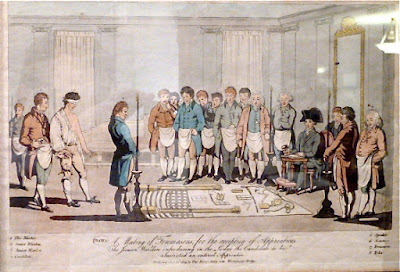 |
| Via Twitter |
It’s Mother’s Day here in the United States, so I thought I’d share with you Bro. Rudyard Kipling’s “The Mother Lodge.” (Copied and pasted from the Kipling Society website. Click here for the poem’s context and history.) Kipling was from Lodge Hope and Perseverance 782 (EC) in Punjab, India.
The Mother Lodge
There was Rundle, Station Master,
An’ Beazeley of the Rail,
An’ ’Ackman, Commissariat,
An’ Donkin’ o’ the Jail;
An’ Blake, Conductor-Sergeant,
Our Master twice was ’e,
With im that kept the Europe-shop,
Old Framjee Eduljee.
Outside - “Sergeant! Sir! Salute! Salaam!”
Inside - “Brother,” an’ it doesn’t do no ’arm.
We met upon the Level an’ we parted on the Square,
An’ I was Junior Deacon in my Mother-Lodge out there!
We’d Bola Nath, Accountant,
An’ Saul the Aden Jew,
An’ Din Mohammed, draughtsman
Of the Survey Office too;
There was Babu Chuckerbutty,
An’ Amir Singh the Sikh,
An’ Castro from the fittin’-sheds,
The Roman Catholick!
We ’adn’t good regalia,
An’ our Lodge was old an’ bare,
But we knew the Ancient Landmarks,
An’ we kep’ ’em to a hair;
An’ lookin’ on it backwards
It often strikes me thus,
There ain’t such things as infidels,
Excep’, per’aps, it’s us.
For monthly, after Labour,
We’d all sit down and smoke
(We dursn’t give no banquets,
Lest a Brother’s caste were broke),
An’ man on man got talkin’
Religion an’ the rest,
An’ every man comparin’
Of the God ’e knew the best.
So man on man got talkin’,
An’ not a Brother stirred
Till mornin’ waked the parrots
An’ that dam’ brain-fever-bird.
We’d say ’twas ’ighly curious,
An’ we’d all ride ’ome to bed,
With Mo’ammed, God, an’ Shiva
Changin’ pickets in our ’ead.
Full oft on Guv’ment service
This rovin’ foot ’ath pressed,
An’ bore fraternal greetin’s
To the Lodges east an’ west,
Accordin’ as commanded.
From Kohat to Singapore,
But I wish that I might see them
In my Mother-Lodge once more!
I wish that I might see them,
My Brethren black an’ brown,
With the trichies smellin’ pleasant
An’ the hog-darn passin’ down;
An’ the old khansamah snorin’
On the bottle-khana floor,
Like a Master in good standing
With my Mother-Lodge once more.
Outside - “Sergeant! Sir! Salute! Salaam!”
Inside - “Brother,” an’ it doesn’t do no ’arm.
We met upon the Level an’ we parted on the Square,
An’ I was Junior Deacon in my Mother-Lodge out there!

















































































